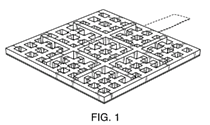Apparatus for converting a table into a card table - Thin mat, felt, and plastic railing to cover a table.

Proposition wager for a card game - During a game of Texas Hold'em, players place a second bet on what the community cards will be in their own right. This is somehow supposed to make the game friendlier to less experience poker players.
Method of playing a dice game side bet - The patent includes a rare, easy to comprehend abstract:
A craps side wager. The player can choose whether the next roll will be even or odd. If the player chose wrong, the player loses the wager. If the player chose right, then the player can win even money on the wager, unless the roll is a craps number, in which the player can win less than even money.Combined sudoku game board and game pieces for visually impaired users - This:


Bayesian scoring - I haven't a fricking clue what this is talking about, but I assume it's some sort of ELO ranking system equivalent. Any math brains want to take a crack at it?
Rotating pattern matching board game - A SIMON game on wheels:

Card-based board game and method of playing the same - The patent first describes "the three types of board games": race games, acquisition games, and strategy games.
It says race games (Candyland) are bad because players do not interact. Acquisition games (Monopoly) are bad because once players are in possession of an item, it's hard for them to lose it, reducing the winning opportunities of the other players. Strategy games (Risk) are bad because confrontations are either guided by rules (such as capture) or luck (such as dice).
This game solves all these problems, says patent. It's a roll and move medieval/fantasy game when you collect weapons, armor, and treasures, and then blind bid for combat. Winner selects a card from loser. How original.
Chess game piece - This:

Mathematics game and method - A very simple deck of cards with numbers where players play valid math equations.
Game of chance - A dice game with exceedingly complicated payout charts, which may have something to do with horse racing.
1 comment:
Bayesian scoring
I didn't read it carefully, but it basically implements an idea I thought of long ago (i.e. it is evident to the layman of the field). You initially guess that all players "level" is zero and your uncertainty about their level is one (i.e. gaussian distribution with mean zero and std.dev. one). Whenever two people play against each other, you get another data point on how the "levels" compare, and also an updated estimate as to how accurate your estimate of a players "level" is. The more accurate you think your estimate of his "level" was, the less you update based on the result of the individual game, and the more you give weight to history. On the other hand, the more disparate the "levels" of the two players were, the less likely it is that the outcome could be explained by the std.deviation. I.e. the more likely it is that you need to update your estimate of their respective "levels". This is a standard technique in Kalman filtering for estimating unknown state parameters. Of course, you don't need to use zero as your base "level" you can start at 2000 with a wider standard deviation to get scores more in line with how people usually quote them. The theory doesn't change at all.
Post a Comment